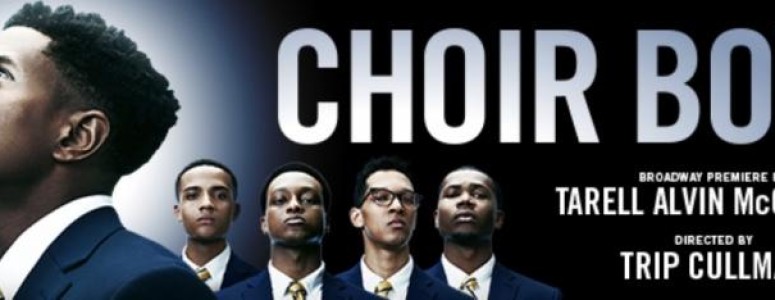Sing Out, Pharus!
By Peter Filichia
There are more profane six-letter words than four-letter ones in CHOIR BOY.
To be sure, Tarell Alvin McCraney’s play at the Friedman uses the S-word a dozen times and the F-one three.
That last figure is a bit surprising, considering that the drama involves teenage boys. Many kids default to F-bombs in conversation, be they frivolous chats or serious discussions.
That the play takes place at a tony prep school may be a reason for the F-restraint. And yet, we do hear our five main African-American characters use the N-word to the Nth degree; no fewer than 14 times do they employ it.
And that ugly word qualifies as a profanity, doesn’t it?
So does the other F-word — the six-letter, century-old epithet that refers to a gay male.
Granted, it’s “only” heard four times, but it’s there. It will make many theatergoers wince as much as the N-word does.
(At least let’s hope so.)
It’s first said by Bobby Marrow, who directs it to classmate Pharus Jonathan Young. Worse, he hisses it out while The Charles R. Drew Preparatory School for Boys’ Choir is performing – and during Pharus’ solo. Because Bobby first snarled out “sissy” three times and Pharus wasn’t unnerved by it, now he’ll try the stronger slur.
In many plays that have employed such a set-up, Pharus would be devastated, break into tears and start planning his suicide. But this is 2019 and most out-of-the-closet gays have stronger ways of coping.
And this Pharus is no shrinking pansy. His being summoned to Headmaster Marrow’s office doesn’t have him respectfully uttering boilerplate “Yes, sirs!” Pharus has plenty of “But” rebuttals which he fervently delivers, never fearing the man or his authority. “I earned my scholarship!” he roars. “I was voted next year’s choir lead almost unanimously.”
We’re not told who was the one dissenting vote. However, doesn’t Bobby Marrow immediately come to mind?
Careful readers may have noticed that Bobby and the Headmaster have the same last name. That’s not a typo. McCraney shrewdly upped the ante by making Bobby the Headmaster’s nephew. That’s not as tight as a father-son relationship, which would bring up a certain level of problems, but close enough to introduce some difficulties.
What’s more, this is the 50th continuous year of the school’s existence, and Headmaster doesn’t want to see that golden anniversary tarnished.
The playwright does make Bobby’s “legacy” into a powerful issue with David. In a brave performance by Caleb Eberhardt, we meet a student whose mother is financially struggling to make him her family’s first college graduate. That Bobby has a much easier, cruise-controlled ride makes David mighty envious.
These are the incisive complications we’d expect from the Oscar-winning writer of MOONLIGHT, the film that the Academy Awards named 2016 Best Picture (well, eventually, anyway). McCraney even makes the chewing of gum a dramatic moment. He also takes us to the school’s locker room numerous times, and only once settles for an all-too-predictable situation.
McCraney does fail at one other moment. When Headmaster Marrow has his first serious talk with his nephew on the incident, he allows one of Bobby’s classmates to stand there and hear everything. No principal engaged in a private conversation would allow that to happen.
On a set made of cinder blocks that designer David Zinn has had painted blood red, Chuck Cooper is appropriately stentorian as Headmaster Marrow with his it-hurts-me-more-than-it-hurts-you attitude. Austin Pendleton plays Dr. Pendleton (that’s not a typo, either), the white teacher who makes a big faux pas in his opening remarks to his new students.
Jeremy Pope is magnificent as Pharus. How you’ll wish you could have had his backbone when you were in school dealing with your teachers. Under Trip Cullman’s beautifully restrained direction, Pope makes Pharus only semi-flamboyant and Anthony, his straight roommate, not overly butch.
That doesn’t mean, however, that John Clay III isn’t strong and effective.
Cullman sees that J. Quinton Johnson’s Bobby isn’t hyper-masculine, either. That allows for the possibility that he’s contemptuous of gays because he’s fighting himself on the issue. Nicholas L. Ashe is Junior, who does well in convincing Bobby that he didn’t commit the teenager’s cardinal-slash-mortal sin: “squealing.”
(McCraney doesn’t tell us who did. He’ll let us figure that out.)
These young actors weren’t just hired for their considerable acting chops. McCraney’s script requires them to sing quite often, and their success there is just as impressive (especially Pope’s angelic falsetto). Despite CHOIR BOY’s being a – no pun intended at all – straight play, it winds up offering some of the best musical moments currently on Broadway.
It’s a very good play, if not a great one. True, McCraney’s off-Broadway work has been more searing. Here, though, he may well have intentionally opted for a more boulevard approach, as many off-Broadway playwrights who’ve been “graduated” to The Main Stem have before him. It usually means more of a mainstream success.
None of that negates what the play does achieve. Early on, Pharus says “Who are they going to believe? The nephew of the school’s headmaster or the little sweet boy they’ve been trying to straighten out for years?” Indeed, Marrow blurts out to Pharus “Why can’t you be — ” and interrupts himself because he knows he shouldn’t say what he really wants to say.
(It’s probably what he also believes).
So CHOIR BOY reminds us that despite all the substantial progress that gays have made happen since – well, since the opening of The Charles R. Drew Preparatory School for Boys – that if you’re gay, you still get little benefit of the doubt, that you have an inning’s worth of strikes against you, and are often perceived as guilty until proven innocent.
And maybe even afterward, too.




